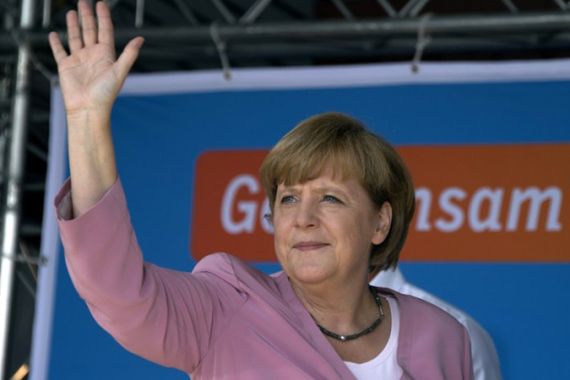Profile: Angela Merkel
The powerful German chancellor will likely retain her post in September 22 elections.

She’s been called the most powerful woman in the world. German Chancellor Angela Merkel has headed the European Union’s most populous country snce 2005, and looks set to remain chancellor after federal elections on September 22.
Merkel was born in 1954 in Hamburg. Her father, a Protestant pastor and a believer in socialism, moved his family from West Germany to East Germany in 1957. Unlike others in tightly controlled East Germany, the family was able to read books from and travel to the West. Nevertheless, says Merkel biographer Jacqueline Boysen, “the father was very, very convinced” in the socialist project and remained a supporter of East Germany until the very end.
In 1973, Merkel went to study physics at Leipzig University, eventually earning a doctorate in quantum chemistry. After the Berlin Wall fell in 1989 and Germany moved towards reunification, Merkel joined the centre-right Christian Democratic Union (CDU) and entered politics. She won a seat in the Bundestag in 1990, and served as minister for women and youth and minister for the environment later that decade.
Merkel – an East German, Protestant woman – was elected leader of the CDU in 2000, a surprising event given that the party had traditionally been male-heavy and Catholic, with its power base in the former West Germany.
“She was underestimated, and everybody laughed about her dress, and her behaviour and the haircut,” said Boysen. “She was kind of alien in western Germany’s political sphere. These very rude commentaries she read in the newspaper every day did not stop her, this did not discourage her from continuing.”
Merkel became Germany’s first female chancellor in 2005, and for the next four years her CDU ruled in a “grand coalition” with the centre-left SPD. In 2009, her party won a convincing victory, and entered into a coalition with the liberal FDP.
The chancellor’s critics say she is overly pragmatic, jettisoning her convictions for the sake of political expediency. In recent years, Merkel has reversed her position on nuclear power, deciding to phase out Germany’s plants by 2022, and has moved closer to the centre on economic policy.
While not an opponent of immigration, Merkel has called on newcomers to integrate into German society. In 2010, she said: “we don’t have too much Islam, we have too little Christianity. We have too few discussions about the Christian view of mankind” in Germany – a view at odds with those of Germany’s left-wing parties, which are staunch advocates of multiculturalism.
The German chancellor is reviled by many people in the debt-strapped countries of southern Europe, who accuse her of using Germany’s economic might and deep pockets to impose unpopular eurozone austerity programmes.
But Merkel is popular for precisely the same reason at home. A large portion of voters admire the fact that she has opposed generous terms for countries seen by many Germans as spendthrift and corrupt, which they fear would come at the expense of their country’s wellbeing. Although only about 40 percent of Germans say they plan on voting for the CDU, more than 60 percent say they approve of Merkel’s performance as chancellor.
And unlike most other Western countries, Germany – thanks to strict controls on banking and flexible labour policy – was not badly scathed by the financial crisis that roiled world markets in 2008.
Merkel’s political style is decidedly reserved: she’s not a flashy or riveting speaker. However, she doesn’t often put her foot in her mouth, either. One exception was earlier this summer when, in the wake of revelations that the US National Security Agency was collecting electronic data from millions of people around the world, Merkel referred to the internet as “neuland”, or “uncharted territory”.
Merkel has no children. Her husband, Joachim Sauer, is also a quantum chemist, and has been notable in his steadfast avoidance of media attention. He even declined to attend her inauguration as chancellor in 2005, preferring to watch from his chemistry lab instead.
Follow Sam Bollier on Twitter as he covers Germany’s federal election: @SamBollier